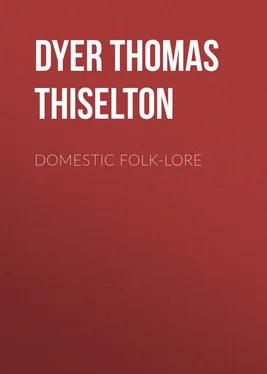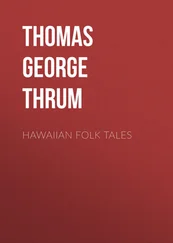Thomas Dyer - Domestic folk-lore
Здесь есть возможность читать онлайн «Thomas Dyer - Domestic folk-lore» — ознакомительный отрывок электронной книги совершенно бесплатно, а после прочтения отрывка купить полную версию. В некоторых случаях можно слушать аудио, скачать через торрент в формате fb2 и присутствует краткое содержание. Жанр: foreign_antique, foreign_prose, на английском языке. Описание произведения, (предисловие) а так же отзывы посетителей доступны на портале библиотеки ЛибКат.
- Название:Domestic folk-lore
- Автор:
- Жанр:
- Год:неизвестен
- ISBN:нет данных
- Рейтинг книги:4 / 5. Голосов: 1
-
Избранное:Добавить в избранное
- Отзывы:
-
Ваша оценка:
- 80
- 1
- 2
- 3
- 4
- 5
Domestic folk-lore: краткое содержание, описание и аннотация
Предлагаем к чтению аннотацию, описание, краткое содержание или предисловие (зависит от того, что написал сам автор книги «Domestic folk-lore»). Если вы не нашли необходимую информацию о книге — напишите в комментариях, мы постараемся отыскать её.
Domestic folk-lore — читать онлайн ознакомительный отрывок
Ниже представлен текст книги, разбитый по страницам. Система сохранения места последней прочитанной страницы, позволяет с удобством читать онлайн бесплатно книгу «Domestic folk-lore», без необходимости каждый раз заново искать на чём Вы остановились. Поставьте закладку, и сможете в любой момент перейти на страницу, на которой закончили чтение.
Интервал:
Закладка:
"If he loves me, pop and fly;
If he hates me, live and die."
As may be imagined, great is the dismay if the anxious face of the inquirer gradually perceives the nut, instead of making the hoped-for pop, die and make no sign. Again, passing on to insects, one means of divination is to throw a lady-bird into the air, repeating meanwhile the subjoined couplet: —
"Fly away east, and fly away west,
Show me where lives the one I like best."
Should this little insect chance to fly in the direction of the house where the loved one resides, it is regarded as a highly-favourable omen. The snail, again, was much used in love-divinations, many an eager maiden anxious of ascertaining her lover's name following the example of Hobnelia, who, in order to test the constancy of her Lubberkin, did as follows: —
"Upon a gooseberry bush a snail I found,
For always snails near sweetest fruit abound.
I seized the vermin, home I quickly sped,
And on the hearth the milk-white embers spread;
Slow crawled the snail, and, if I right can spell,
In the soft ashes marked a curious L.
Oh! may this wondrous omen lucky prove,
For 'L' is found in Lubberkin and Love."
Three magpies are said to prognosticate a wedding; and in our rural districts the unmarried of either sex calculate the number of years of single blessedness still allotted to them by counting the cuckoo's notes when they first hear it in the spring.
Some days are considered specially propitious for practising love-divinations. Foremost among these is St. Valentine's Day, a festival which has been considered highly appropriate for such ceremonies, as there is an old tradition that on this day birds choose their mates, a notion which is frequently alluded to by the poets, and particularly by Chaucer, to which reference is made also in A Midsummer Night's Dream : —
"Good morrow, friends, St. Valentine is past;
Begin the wood-birds but to couple now."
Thus, the Devonshire young ladies have a fancy that on St. Valentine's Day they can, if they wish, make certain of their future. If so disposed, they go into the churchyard at midnight, with some hempseed in their hand, which, after they have walked round the church a certain number of times, they scatter on either side as they return homewards, repeating a certain charm. It is supposed that the true lover will be seen taking up the hempseed just sown, attired for the ceremony in a winding-sheet. Another species of love-divination once observed consisted in obtaining five bay leaves, four of which the anxious maiden pinned at the four corners of her pillow, and the fifth in the middle. If she was fortunate enough to dream of her lover, it was a sure sign that he would be married to her in the course of the year. Again, some young people would boil an egg hard, and, after taking out the contents, fill the shell with salt, the charm consisting in eating the shell and salt on going to bed at night without either speaking or drinking after it. A further method of divination was practised in the following way: – The lady wrote her lovers' names upon small pieces of paper, and, rolling them up in clay, put them into a tub of water. The first that rose to the surface was to be not only her Valentine, but, in all probability, her future husband.
Another time, which has been equally popular from time immemorial for such superstitious practices, is Midsummer Eve. People gathered on this night the rose, St. John's wort, trefoil, and rue, each of which was supposed to have magical properties. They set orpine in clay upon pieces of slate in their houses, under the name of a Midsummer man. As the stalk next morning was found to incline to the right or left, the anxious maiden knew whether her lover would prove true to her or not.
Hallowe'en, again, has been supposed to be the time, of all other times, when supernatural influences prevail, and on this account is regarded as a night of sure divination in love matters. All kinds of devices have, therefore, been resorted to at this season, and in the North of England many superstitions still linger on, where this festival is known as "nutcrack-night," from nuts forming a prominent feature in the evening feast. Once more, Christmas Eve is well known to love-sick swains and languishing maidens as an excellent day for obtaining a glimpse into futurity. Numerous are the spells and ceremonies by which this is attempted. Thus in some places, at "the witching hour of night," the young damsel goes into the garden and plucks twelve sage leaves, under the belief that she will see the shadowy form of her future husband approach her from the opposite end of the ground. In trying this delicate mode of divination great care must be taken not to break or damage the sage-stalk, as should this happen serious consequences might ensue. The following barbarous charm was also much practised in days gone by: – The heart was taken from a living pigeon, stuck full of pins, and laid on the hearth, and while it was burning, the form of the young person's future partner was believed to become visible to mortal eye.
Friday has been held a good day of the week for love omens, and in Norfolk the following lines are repeated on three Friday nights successively, as on the last one it is believed that the young lady will dream of her future husband: —
"To-night, to-night, is Friday night,
Lay me down in dirty white,
Dream who my husband is to be;
And lay my children by my side,
If I'm to live to be his bride."
There are numerous other modes of matrimonial divination which still find favour in the eyes of those who prefer the married state to that of virginity. Thus the seeds of butter-dock must be scattered on the ground by a young unmarried girl half an hour before sunrise on a Friday morning in a lonesome place. She must strew the seeds gradually on the grass, saying these words: —
"I sow, I sow!
Then, my own dear,
Come here, come here,
And mow, and mow."
After this she will see her future husband mowing with a scythe at a short distance from her. She must, however, display no symptoms of fear, for should she cry out in alarm he will immediately vanish. This method is said to be infallible, but it is regarded as a bold, desperate, and presumptuous undertaking. Some girls, again, make a hole in the road where four ways meet, and apply their ear to it, with the hope of learning of what trade their future husband is to be. It is unnecessary, however, to illustrate this part of our subject further, for the preceding pages amply show how varied and extensive are the omens and divinations connected with an event without which life is considered in the eyes of most persons incomplete. Although these may seem trivial and often nonsensical, yet they have often exercised an important influence over that period of anxious suspense which intervenes between courtship and marriage, often tantalising and damping in a cruel manner the hopes of many an ardent lover.
CHAPTER IV
MARRIAGE
Seasons and Days propitious to Marriage – Superstitions connected with the Bride – Meeting a Funeral – Robbing the Bride of Pins – Dancing in a Hog's Trough – The Wedding-cake – The Ring.
In selecting the time for the marriage ceremony precautions of every kind have generally been taken to avoid an unlucky month and day for the knot to be tied. Indeed, the old Roman notion that May marriages are unlucky survives to this day in England, a striking example, as Mr. Tylor has pointed out in his "Primitive Culture," of how an idea, the meaning of which has perished for ages, may continue to exist simply because it has existed. That May with us is not a month for marrying may easily be seen any year from the list of weddings in the Times newspaper, the popular belief being summed up in the familiar proverb, "Marry in May and you'll rue the day." Some of the numerous reasons assigned for the ill-luck attaching to this month are the following: – That women disobeying the rule would be childless; or if they had children, that the first-born would be an idiot, or have some physical deformity; or that the married couple would not live happily together in their new life, but soon become weary of each other's society – superstitions which still retain their hold throughout the country. In spite, however, of this absurd prejudice, it seems that in days gone by May was honoured in feudal England as the month of all months especially congenial to lovers. Most readers are no doubt acquainted with the following stanza in the "Court of Love: " —
Читать дальшеИнтервал:
Закладка:
Похожие книги на «Domestic folk-lore»
Представляем Вашему вниманию похожие книги на «Domestic folk-lore» списком для выбора. Мы отобрали схожую по названию и смыслу литературу в надежде предоставить читателям больше вариантов отыскать новые, интересные, ещё непрочитанные произведения.
Обсуждение, отзывы о книге «Domestic folk-lore» и просто собственные мнения читателей. Оставьте ваши комментарии, напишите, что Вы думаете о произведении, его смысле или главных героях. Укажите что конкретно понравилось, а что нет, и почему Вы так считаете.












